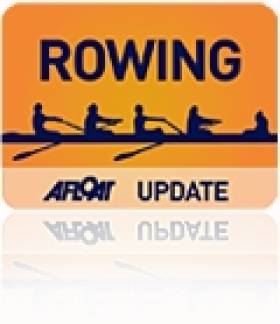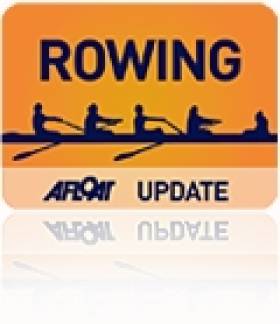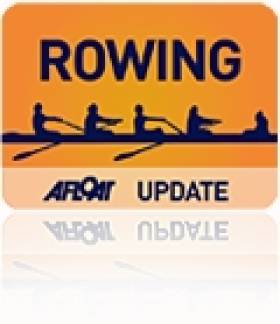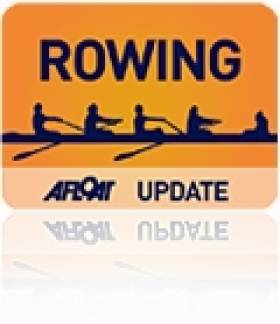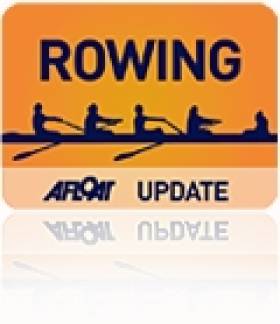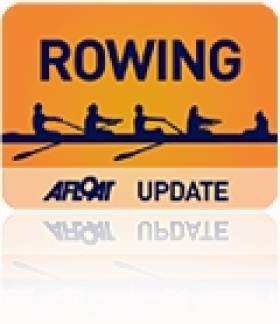Displaying items by tag: Irish Championships
#ROWING: Two of the big wins of the evening session of finals at the Irish Rowing Championships at the National Rowing Centre in Cork came to crews with very different levels of experience.
The Cork Boat Club junior women’s eight made a breakthrough for the club at this level by beating Portora and Bann in a fine race. The senior men’s quadruple was taken by the crew of Albert Maher, Sean Jacob, Con Collis and Michael Maher, who held off a challenge from the Castleconnell/University of Limerick crew. Jacob and Maher are both in their forties and have over 40 ‘Pots’ between them.
The women’s senior pair was won by Barbara O’Brien and Aifric Keogh, representing NUIG, while Sarah Quinn of Belfast Boat Club won the Club singles.
The junior men’s quadruple gave Shandon’s young crew – two are junior 17 athletes and one a junior 16 – a fine win over Skibbereen, who faltered before the finish.
The women’s lightweight single sculls final turned into a battle between Claire Lambe of Old Collegians and Siobhán McCrohan of Tribesmen, with the Dubliner coming out on top.
Turlough Hughes of UCD had a remarkably straightforward win over David O’Malley of St Michael’s in the men’s intermediate single sculls, while UCD held off a late charge by Queen’s to win the men’s novice eight.
Irish Rowing Championships, National Rowing Centre, Cork (Selected Results; Finals)
Men
Eight – Intermediate: 1 Trinity 5:46.25, 2 NUIG 5:50.28, 3 UCD 5:56.96. Novice: 1 UCD 6:59.50, 2 Queen’s 7:02.31, 3 Trinity 7:03.29.
Four, coxed – Junior: 1 Cork BC 6:35.99, 2 Presentation 6:36.22, 3 Portora 6:38.08.
Pair – Senior: 1 UCD (M O’Donovan, N Kenny) 6:46.05, 2 NUIG 6:49.95, 3 Commercial B 7:00.16.
Sculling, Quadruple – Senior: 1 Old Collegians/Commercial (C Collis, S Jacob, A Maher, M Maher) 5:59.84, 2 Castleconnell/University of Limerick 6:00.60, 3 Queen’s 6:07.90.
Junior: 1 Shandon 6:08.24, 2 Athlone 6:13.34, 3 Skibbereen 6:15.52.
Single – Intermediate: 1 UCD (T Hughes) 7:13.0, 2 St Michael’s (O’Malley) 7:20.72, 3 NUIG (O’Connor) 7:25.14. Club: Lee (D O’Sullivan) 7:31.80, 2 St Michael’s (P O’Connor) 7:36.24, 3 Belfast BC (A Murray) 7:39.44.
Women
Eight – Novice: 1 Queen’s 7:19.74, 2 Trinity 7:55.75. Junior: 1 Cork BC 6:39.32, 2 Portora 6:41.90, 3 Bann 6:45.27.
Sculling, Double – Intermediate: 1 Killorglin (F Foley, M Dukarska) 7:17.17, 2 Commercial 7:20.83, 3 Skibbereen 7:39.99.
Pair – Senior: 1 NUIG (B O’Brien, A Keogh) 7:33.89, 2 St Michael’s 7:42.32, 3 Shannon 7:42.48.
Single – Lightweight: 1 Old Collegians (C Lambe) 7:41.70, 2 Tribesmen (McCrohan) 7:43.80, 3 Skibbereen (Hayes) 8:01.34. Club: 1 Belfast (S Quinn) 8:09.22, 2 Queen’s (Edwards) 8:10.61, 3 Lee (McGuire) 8:39.69.
Junior: 1 Cork BC (O Forde) 8:06.14, 2 Belfast BC (J English) 8:07.11, 3 Commercial B 7:00.16.
#ROWING: The men’s junior coxed four was the standout race of the morning session at the Irish Rowing Championships at the National Rowing Centre in Cork today. It took a photo finish to confirm Cork Boat Club’s win over Presentation, with Portora also disputing the lead right to the last 50 metres.
Cork Boat Club also took the women’s junior single sculls title through Oisin Forde, who won a fine battle with Jasmine English of Belfast Boat Club. Forde is from Torrevieja in Spain and with her sister Dervla, who was third, will represent Ireland at the Coupe de la Jeunesse next month.
The men’s senior pair final gave Mark O’Donovan and Niall Kenny of UCD a chance to show why they are in the frame to represent Ireland at the World Championships this year, while a former international Fiola Foley partnered a current one, Monika Dukarska to win the women’s intermediate doubles title.
Irish Rowing Championships, National Rowing Centre, Cork (Selected Results; Finals)
Men
Eight – Intermediate: 1 Trinity 5:46.25, 2 NUIG 5:50.28, 3 UCD 5:56.96.
Four, coxed – Junior: 1 Cork BC 6:35.99, 2 Presentation 6:36.22, 3 Portora 6:38.08.
Pair – Senior: 1 UCD (M O’Donovan, N Kenny) 6:46.05, 2 NUIG 6:49.95, 3 Commercial B 7:00.16.
Sculling
Single: Lee (D O’Sullivan) 7:31.80, 2 St Michael’s (P O’Connor) 7:36.24, 3 Belfast BC (A Murray) 7:39.44.
Women
Eight – Novice: 1 Queen’s 7:19.74, 2 Trinity 7:55.75.
Sculling, Double – Intermediate: 1 Killorglin (F Foley, M Dukarska) 7:17.17, 2 Commercial 7:20.83, 3 Skibbereen 7:39.99.
Single – Junior: 1 Cork BC (O Forde) 8:06.14, 2 Belfast BC (J English) 8:07.11, 3 Commercial B 7:00.16.
O'Callaghan Honoured at National Rowing Centre
#ROWING: Rowing Ireland honoured Mick O'Callaghan at the Irish Rowing Championships at the National Rowing Centre in Cork today. Bernard Allen, the former Minister for Sport and TD for Cork North Central, unveiled a special plaque to the Lee Valley man for his "enormous contribution" to the development of the impressive Centre. The plaque is at the front left of the boathouse, close to where presentations are made to winners at the Championships.
#ROWING: Enniskillen club Portora bridged a gap back to 1980 when they won the junior men’s eights title at the Irish Rowing Championships at the National Rowing Centre in Cork today. St Joseph’s of Galway, seeking their third successive junior eights crown, fought it out with Portora down the course, but the boys in black and gold kept their heads impressively to pull away at the end.
The Gráinne Mhaol four of Fionnán Tolan, Alan Martin, Cormac Folan and James Wall beat Old Collegians to win the senior fours. The first half of the race was a nip-and-tuck battle, but the Galway crew moved away at 1250 metres to win well.
UCD and NUIG fought it out right to the finish in the women’s intermediate eights, with the Dublin college just shading it. UCD also won the inaugural men’s club eight – by almost eight seconds.
Justin Ryan gave UCC a title when he won the lightweight single sculls from Tim Harnedy of Skibbereen. The west Cork club added to their title roll by winning the junior women’s four.
Clonmel won the women’s novice coxed quadruple sculls from NUIG.
Irish Rowing Championships, National Rowing Centre, Cork (Selected Results, Finals)
Men
Eight – Club: 1 UCD 6:03.79, 2 Skibbereen 6:11.41, 3 Trinity B 6:13.04. Junior: 1 Portora 6:06.24, 2 St Joseph’s 6:10.21, 3 Bann 6:17.78.
Four – Senior: 1 Gráinne Mhaol 6:10.15, 2 Old Collegians 6:14.81.
Four, coxed – Intermediate: 1 NUIG 6:26.37, 2 Carlow 6:29.33, 3 Neptune 6:36.71.
Sculling, Quadruple – Novice, coxed: 1 Queen’s 6:49.52, 2 Clonmel 7:01.83, 3 Kenmare 7:17.56.
Double – Senior: 1 Skibbereen 6:30.22, 2 Three Castles 6:34.96, 3 UCC 6:45.32.
Single – Lightweight: 1 UCC (J Ryan) 7:26.61, 2 Skibbereen (T Harnedy) 7:31.73, 3 UCD (S Toland) 7:39.60.
Junior: 1 St Michael’s (D O’Malley) 7:17.53, 2 Shannon (C Carmody) 7:22.81, 3 Waterford (A Goff) 7:25.24.
Women
Eight – Intermediate: UCD 6:44.30, 2 NUIG 6:44.92, 3 Queen’s 6:55.60.
Four – Senior: 1 NUIG/Cork 6:57.92, 2 Trinity 7:09.18, 3 Skibbereen 7:16.93. Junior Four: 1 Skibbereen 7:18.45, 2 Muckross 7:29.03, 3 Shannon 7:31.07.
Four, coxed – Club: 1 NUIG A 7:25.50, 2 UCC 7:33.87, 3 Skibbereen 7:38.30.
Pair – Intermediate: 1 St Michael’s 7:49.72, 2 Trinity 7:53.27, 3 Shannon 7:53.29.
Sculling,
Quadruple – Novice, coxed: 1 Clonmel 7:47.42, 2 NUIG 8:03.81, 3 Athlunkard 8:48.81.
Double – Junior: 1 Cork 7:26.87, 2 Belfast 7:32.25, 3 Commercial 7:36.33.
O'Malley Takes Junior Title at Irish Rowing Championships
ROWING: David O’Malley won the junior single sculls title at the Irish Rowing Championships at the National Rowing Centre today. The St Michael’s man carved out an early lead over last year’s champion Conor Carmoday of Shannon and stretched it to two and a half lengths by half way. Carmody, under pressure himself from Waterford’s Andrew Goff, cut the lead in the closing stages, but O’Malley held on.
The men’s senior doubles was won impressively by Gary O’Donovan and Shane O’Donovan of Skibbereen from Eimantas Grigalius and Dave Neale of Three Castles, while NUIG/Cork won the women’s senior four. The women’s junior doubles was won by Oisin and Dervla Forde, who live in Torrevieja in Spain, but were campaigning for Cork Boat Club.
Irish Rowing Championships, National Rowing Centre, Cork (Selected Results, Finals)
Men
Four, coxed – Intermediate: 1 NUIG 6:26.37, 2 Carlow 6:29.33, 3 Neptune 6:36.71.
Sculling, Quadruple – Novice, coxed: 1 Queen’s 6:49.52, 2 Clonmel 7:01.83, 3 Kenmare 7:17.56.
Double – Senior: 1 Skibbereen 6:30.22, 2 Three Castles 6:34.96, 3 UCC 6:45.32.
Single – Junior: 1 St Michael’s (D O’Malley), 2 Shannon (C Carmody), 3 Waterford (A Goff).
Women
Four – Senior: 1 NUIG/Cork 6:57.92, 2 Trinity 7:09.18, 3 Skibbereen 7:16.93.
Four, coxed – Club: 1 NUIG A 7:25.50, 2 UCC 7:33.87, 3 Skibbereen 7:38.30.
Pair – Intermediate: 1 St Michael’s 7:49.72, 2 Trinity 7:53.27, 3 Shannon 7:53.29.
Sculling
Double – Junior: 1 Cork 7:26.87, 2 Belfast 7:32.25, 3 Commercial 7:36.33.
#ROWING: The Irish Rowing Championships, which begins on Friday, have had a slight change to the entry. After a challenge, Rowing Ireland discovered an anomaly in the original tracking system. Denise Walsh, previously entered in the women’s intermediate single sculls, has now been moved up to the senior single sculls.
The Rowing Ireland statement said: Following the publication of the list of entries for the Championship regatta, a challenge was made regarding the eligibility of a competitor. Having checked the rower’s record, it was discovered that U23 wins (clearly described as senior in the GL documents) on the old Tracker system were not being included in the points calculation as they had to be set-up as “invitation” on the old system. A review was subsequently carried out of all rowers who might be impacted by this issue. Approximately thirty rowers were effected and all have had their records altered to reflect the U23 wins. Only two were found to be entered in Championship events for which they were not eligible.
Having considered the matter, the Board of Rowing Ireland decided that as the two rowers had entered the Championship events in good faith, it was only fair to permit the two rowers to move to a Championship grade at which they are eligible to compete. One of the rowers has opted to scratch from the event for which he is not eligible. The other rower has been moved to the WS1X. As a result there will be an additional entry in the WS1X which did not appear on the original list of entries.




























